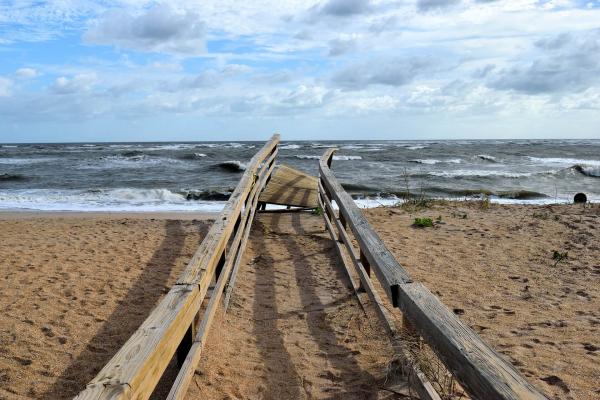ONE OF THE conceits of modern life is that it’s always going to work out, always going to be okay. Indeed, it’s going to be better than it ever was. But the world is testing that idea.
When Hurricane Maria slammed into Puerto Rico—its buzz-saw eye ripping from one end of the island to the other—it changed almost everything in the course of a few hours. Gone were airports and roads. Eighty percent of the island’s crops were destroyed—think of that. Almost all the cell towers: There were profound images of groups of people standing in fields where the few remaining transponders would catch a signal, desperately trying to phone friends and family. Electricity was suddenly a thing of the past, and in places likely to stay that way for six months or a year. And when you lose electricity—well, there goes AC, not to mention ice. The concept of cold disappears for a while. Modernity retreats.
In a rational world, we would rebuild Puerto Rico with a bunch of solar microgrids, so that there couldn’t be this kind of devastation ever again. But, of course, that’s not what we’re doing—at best, FEMA is trying to stand back up what was there before. But even that is going to be a stretch, because the damage that was done to the island is the equivalent of 30 percent of its annual GDP. Think about what would happen to your family if you got sick tomorrow and your household income went down by a third. Think about the psychological trauma, and think about the sheer economic cliff that represents.
Houston and Florida are going through something similar, of course. But in the rich parts of those places, there are still the resources to make people whole, to start again. Maybe not entirely—the federal flood insurance program, for instance, is never going to be the same, and that’s going to cause the price of real estate to start falling, and so on. But for the moment, Naples will likely recover. The poor parts of Texas and the Sunshine State are more like Puerto Rico, of course—they don’t have the buffer.
We’re starting to realize how unbuffered the whole planet is. At least Puerto Rico won’t be permanently underwater—that’s the fate of many island nations, unless we act very fast. But everywhere new vulnerabilities emerge almost daily. You can’t do something as enormous as destabilizing the entire planet and expect it not to wreck whole swaths of lives.
It’s clear what our job is: It’s to do all we can to address that suffering. We’ve got a military—its job this winter should be making sure that Puerto Rico is as fixed up as it can be, because they’re the only ones who can work on that kind of scale.
But our job, also, is to staunch the flow of carbon into the atmosphere. Maria is what happens with 1 degree Celsius of global warming. We’re currently on a path for an increase of 3 or 4 degrees Celsius. That would be enough to join the whole planet in a community of collapse.

Got something to say about what you're reading? We value your feedback!

